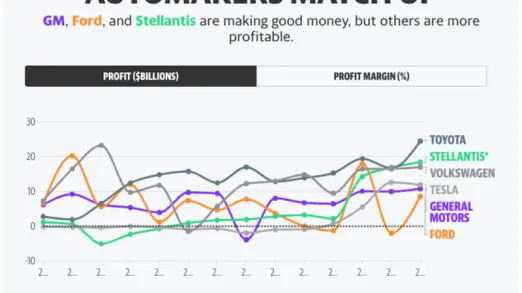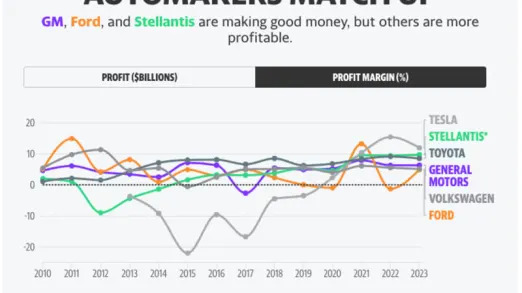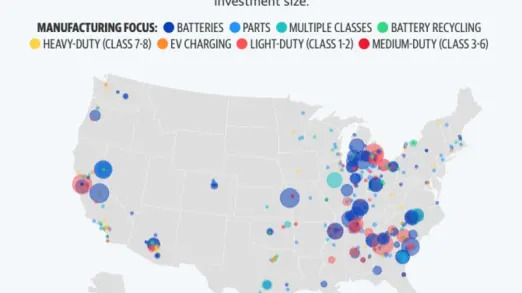By Rick Newman / Yahoo Finance Senior Columnist
Nobody makes enemies like Donald Trump, and his 2024 presidential election campaign promises some interesting new ones. The most recent: electric vehicles.
Trump is wading into the autoworkers strike by claiming that EVs threaten blue collar livelihoods. That’s a clear attack on President Biden, who wants to slash carbon emissions by boosting EVs to 50% of new car sales by 2030, from about 7% today. Electric vehicles don’t burn fossil fuels and have no tailpipe emissions, so they help address global warming, as long as the electricity that powers them is relatively clean.
Trump has begun calling Biden’s plan a “ridiculous all-electric car hoax,” and he blames the United Auto Workers (UAW) leadership for complicity in the scheme. He claims “all of these cars are going to be made in China,” which, if true, would destroy auto worker jobs in the United States.
The solution? Elect Trump, of course.
The EV attack is a classic Trump tactic: Conflate a real issue with a phony one and embellish the whole thing to the point of absurdity.
The real issue is the autoworkers’ quest for better pay, benefits, and job security. Unions have been in steady decline for decades and autoworkers want assurances from General Motors, Ford, and Stellantis that they’ll be able to support their families well into the future.
The phony issue is the “EV hoax.” EVs are no hoax. Tesla proves that. Tesla has become the world’s most profitable automaker — and a moonshot stock — by putting 4.5 million electric cars on the road and winning rave reviews from buyers. Many automakers now emulate the upstart Tesla, instead of the other way around, because they think Tesla has identified the future of transportation.


[Drop Rick Newman a note, follow him on Twitter, or sign up for his newsletter.]
The absurd embellishment is Trump’s claim about all the EVs coming from China. Trump himself took steps to prevent that when he was president, by imposing new tariffs on Chinese imports. The Trump tariffs are still there. If China starts importing cars to the United States, it’s a sign that Trump’s own trade policy failed.
Trump plans a primetime address to striking autoworkers in Michigan on Sept. 27, which will be a test of whether his EV onslaught gets any traction. The UAW endorsed Biden in 2020, and will almost certainly endorse him again in 2024. Trump is clearly trying to roil the union leadership, while lobbying for blue collar votes in crucial swing states such as Michigan and Wisconsin.
Biden has his own pitch to those workers. Last year, he signed into law powerful new incentives to build EVs and other green energy components in the United States. The 2022 Inflation Reduction Act included valuable tax breaks for companies that build U.S. factories and hire American workers, including unionized ones.
The law is already having a pronounced effect. An unprecedented boom in factory construction is underway, directly linked to the new tax breaks. Manufacturing employment seems sure to rise once those plants come online. Biden may have gotten much more than he bargained for in the IRA. When Congress passed the law last year, budget analysts estimated the green energy tax breaks would cost around $385 billion during the next 10 years. But companies have applied for the tax breaks at a much faster pace than expected, and the 10-year cost now looks to be around $1.2 trillion.

Instead of green energy jobs going overseas, foreign firms are coming to the United States, to partner with American companies and build EV battery plants here. The most likely problem isn’t disappearing jobs, it’s a lack of skilled workers to run all the new factories.
Autoworkers have one legitimate concern about electric vehicles. They have fewer parts than gas-powered cars and require fewer workers to build. That’s an issue in the strike. But the union’s real worry isn’t a lack of jobs — it’s that many of the new green energy jobs won’t be unionized. Tax breaks in the IRA are generally larger for companies that pay union-level wages, but many companies may opt for smaller tax breaks and non-unionized workers.
Other peculiar battle lines seem to be forming. The one person who could rebut Trump’s “EV hoax” with bulletproof authority is Tesla CEO Elon Musk, who has become the world’s richest non-kleptocrat by selling EVs. Musk is Trumpy himself, and he reactivated Trump’s banned Twitter account after buying the social media platform last year. So Musk would have credibility in Trumpworld if he said, "Sorry Don, EVs are the real deal."
But Musk may not want to defang Trump. Musk loathes unions and may enjoy the spectacle of Trump trying to pit union workers against their leaders. Musk also has a beef with Biden, whom he called a “damp sock puppet” last year, because Biden talks up unionized Detroit automakers while mostly ignoring non-unionized Tesla. Trump is the enemy of not one, but two of Musk’s own enemies, which could make him doubly useful to Musk.
Contrary to what Trump says, electric vehicles are increasingly affordable, pragmatic, and economically viable as a business. While not a panacea, they help cut carbon emissions and contain global warming. For people who don’t want an EV, gas-powered cars will still be available for years and probably decades. Biden’s policies are speeding the transition to greener cars, but not killing the traditional car business.
Trump’s propaganda succeeds, however, when the facts are a little bit complicated and a few misleading claims can leave voters confused. He’s now employing that formula to vilify EVs and their big champion, Biden. EVs are here to stay, but they’re now politicized like seemingly everything else in America.
Rick Newman is a senior columnist for Yahoo Finance. Follow him on Twitter at @rickjnewman.
Click here for politics news related to business and money
Read the latest financial and business news from Yahoo Finance

Sign in to post
Please sign in to leave a comment.
Continue